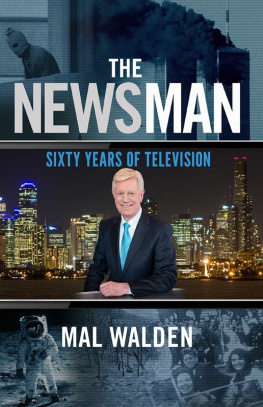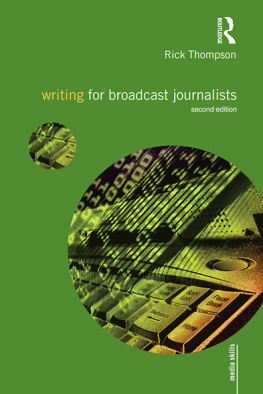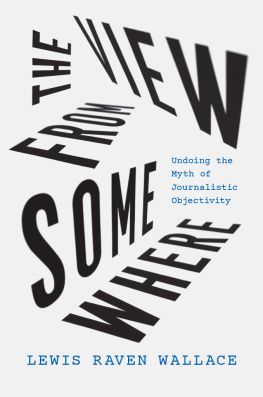The Myth of Post-Racialism in Television News
Libby Lewis has provided an essential tool in giving agency and voice to the many Black journalists who have tirelessly worked to provide complex representations of people of color in their stories and news organizations.
Akil Housten, Ohio University, USA
This book explores the written and unwritten requirements Black journalists face in their efforts to get and keep jobs in television news. Informed by interviews with journalists themselves, Lewis examines how raced Black journalists and their journalism organizations process their circumstances and choose to respond to the corporate and institutional constraints they face. She uncovers the social construction and attempted control of Blackness in news production and its subversion by Black journalists negotiating issues of objectivity, authority, voice, and appearance along sites of multiple differences of race, gender, and sexuality.
Libby Lewis is a Lecturer in African American Studies at the University of California, Los Angeles, USA. She earned a Ph.D. in African Diaspora Studies with a Designated Emphasis in Women, Gender, and Sexuality Studies from the University of California, Berkeley, USA.
Routledge Transformations in Race and Media
Series Editors: Robin R. Means Coleman University of Michigan, Ann Arbor Charlton D. McIlwain New York University
1 Interpreting Tyler Perry
Perspectives on Race, Class, Gender, and Sexuality
Edited by Jamel Santa Cruze Bell and Ronald L. Jackson II
2 Black Celebrity, Racial Politics, and the Press
Framing Dissent
Sarah J. Jackson
3 The Cultural Politics of Colorblind TV Casting
Kristen J. Warner
4 The Myth of Post-Racialism in Television News
Libby Lewis
First published 2016
by Routledge
711 Third Avenue, New York, NY 10017
and by Routledge
2 Park Square, Milton Park, Abingdon, Oxon OX14 4RN
Routledge is an imprint of the Taylor & Francis Group, an informa business
2016 Taylor & Francis
The right of Libby Lewis to be identified as author of this work has been asserted by her in accordance with sections 77 and 78 of the Copyright, Designs and Patents Act 1988.
All rights reserved. No part of this book may be reprinted or reproduced or utilised in any form or by any electronic, mechanical, or other means, now known or hereafter invented, including photocopying and recording, or in any information storage or retrieval system, without permission in writing from the publishers.
Trademark notice: Product or corporate names may be trademarks or registered trademarks, and are used only for identification and explanation without intent to infringe.
Library of Congress Cataloging in Publication Data
Lewis, Libby, 1967-
The myth of post-racialism in television news / Libby Lewis.
pages cm. (Routledge transformations in race and media ; 4)
Includes bibliographical references and index.
1. Racism in the pressUnited States. 2. Television broadcasting of newsPolitical aspectsUnited States. 3. Mass media and race relationsUnited States. 4. African American journalistsSocial conditions. 5. Race discriminationUnited States. I. Title.
PN4888.R3L49 2015
070.4'493058dc23 2015015167
ISBN: 978-1-138-81241-3 (hbk)
ISBN: 978-1-315-74883-2 (ebk)
Typeset in Sabon
by codeMantra
This book is dedicated to journalists struggling against the powers that be who tell them that their voices are not valid. Your vigilance is our greatest asset.
I got my start in journalism as an intern for KCBS-TV in Los Angeles and decided to pursue a Masters degree at the Graduate School of Journalism at the University of California, Berkeley. Once there, I experimented with different news mediums. I worked as a photographer for the small, graduate, student-run newspaper at U.C. Berkeley. I was hired as a newspaper reporter for the San Francisco Examiner, which was then owned by the Hearst Corporation. I later earned a position as an intern for the San Francisco NBC affiliate television news station working for the Target 4 Investigative Unit. Working in television felt right; I enjoyed researching information and decided to pursue reporting. I later worked as an anchor/reporter, producer, and in other capacities for CBS, and much later I came back to NBC but in another state. At the time, I came to understand the importance of the sales department in the news business, particularly for media managers whose job security relies on maintaining and exceeding the bottom line of higher ratings and revenue. I soon discovered that before I could receive acceptance from corporate television news management, I would have to conform to their vision of professionalism. I learned that objectivity translated into an emphasis on everyone checking difference at the door. It also became painfully obvious that some of us were under more scrutiny than others.
Despite these circumstances, the explanations given for checking ones difference at the door always seemed to make sense. We were told that stories mattered, not the reporters who tell them. We were told that our bodies must not become distractions, and therefore we must maintain continuity in our look and image because the audience is easily confused and distracted. As a result of my attempts to fit into this environment, I became interested in how other Black journalists met the challenges of their careers in the face of management imperatives and an ongoing politics of representation within television news. In turn, I began networking with other Black journalists as an attempt to understand what I had thought to be unique to my experience.
I soon found out that my experience was not unique at all and that it is indicative of a dilemma shared by many Black journalists attempting to remain employed while maintaining some degree of authenticity in their work. Following my review of media studies literature, I became increasingly interested in situating the experiences of Black journalists within television news because the literature at the time lacked attention to how journalists who are operating from positions of difference produce, circulate, and enact (Gray 1995, 2) a particular genre of the human (Wynter 2006, 119) within these social institutions. Contrary to the conventional story in the Media Studies literature, this study does not take the position that journalists approach the news in the same way because the United States consists of complex individuals who do not experience North America in the same way. I chose to take a different approach in my analysis of the television news industry. By analyzing how Black reporters and anchors meet the challenges of their jobs, I uncover the disruptive moments and innovation that emerges in their responses to what is at times described by journalists as a hostile work environment.
While I do so, I illustrate in this study how Black journalists make escape routes, contingency strategies, and cultural moves while engaging in a struggle over representations of Blackness in television news. The significance of this study is that it offers a glimpse of the inner workings of corporate television news media that privileges marginalized perspectives. The experiences of Black journalists are also telling because they expose an ongoing struggle over representations of Blackness that betray the myth of meritocracy and objectivity that the journalism profession so desperately clings to in its attempts to mass produce television news for the public good.





